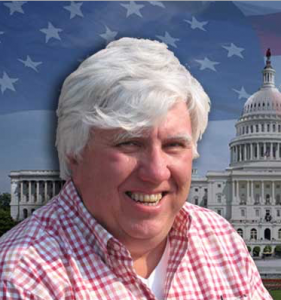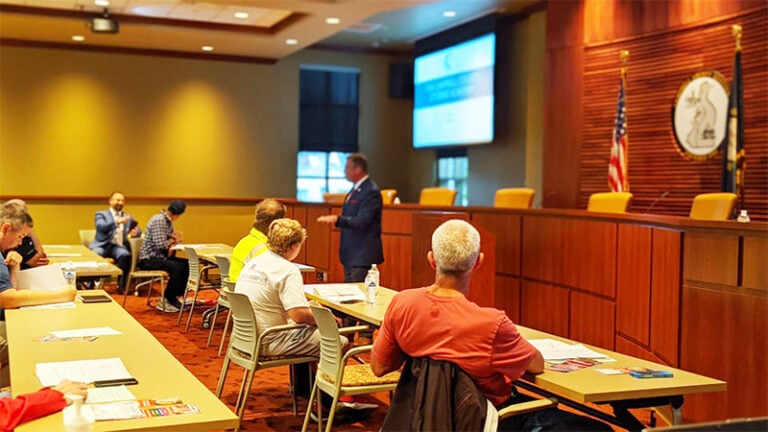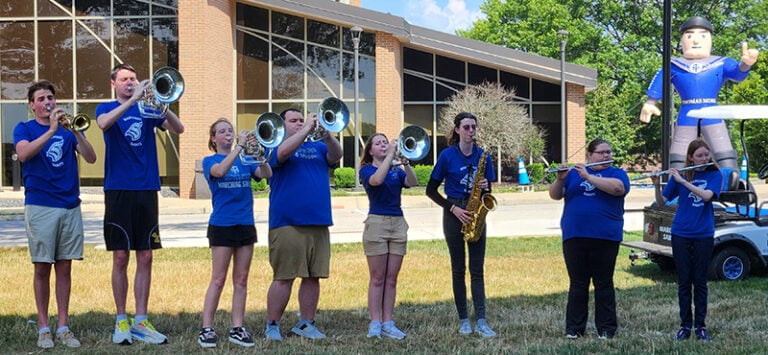Now that Democratic Gov. Andy Beshear has vanquished Republican Daniel Cameron in his bid for re-election in the fire engine red Commonwealth of Kentucky (for the record, I thought Cameron would pull it off), speculation nationally is centered not so much on what Beshear achieved but what he might do in the future.
It’s time to put the cart before the horse once again and involve ourselves in much-too-early speculation about Beshear and whether he would make an attractive Democratic presidential candidate in 2028. After a decisive win in this overwhelmingly Republican state – former President Donald J. Trump, a Republican, drew just short of 63 percent of the vote in 2020 – Beshear would seem to be well positioned if he reaches for the White House. This second term will end in December 2027, providing him with plenty of time to mount a campaign.
A national poll released in April determined that Beshear is the nation’s most popular Democratic governor with a 63 percent approval rating from sea to shining sea. He’s attractive, well-spoken and developed a strong bond with the people he represents – consider his handling of the Western Kentucky tornados and the Eastern Kentucky floods that contributed to his re-election campaign.

It can already be imagined in the mind’s eye of an ambitious campaign consultant that Beshear could be portrayed as former President Bill Clinton 2.0 without the saxophone or the wandering eye. They both conducted successful campaigns to overcome the odds in conservative southern states, offered a moderate agenda, could point to executive experience and maintained a downhome aura. When Clinton left the White House for the final time in January 2001 after eight years in office, a Gallup survey declared that he exited with a 60 percent approval rating.
But the Democratic Party is a different animal than the one Clinton helmed more than 20 years ago – it has drifted left (although not nearly as far as the GOP has shifted right) and it therefore could turn out that Beshear’s political deficiencies outweigh his assets on the national stage.
Andy Beshear is a middle-aged White man in a party controlled to large extent by college-educated women and people of color, many of whom are sick and tired of being led by cis males, as the modern vernacular would have it. The party nominated Hilary Clinton for president in 2016 and offered up Kamala Harris, a woman of color, for vice president in 2020. It would not be a surprise if Democratic primary voters insist in 2028 that the time is ripe to place a woman once again at the top of the ticket.
And there will be several to choose from. Republicans have sought to portray Harris as some stumblebum. A recent profile on 60 Minutes showed her to be anything but and she could prove to be a formidable candidate. She is both well-spoken and sharp. although the possibility exists, should she and President Biden be returned to office after the November 2024 election, that Democratic voters succumb to Biden administration fatigue and search elsewhere for a standard-bearer.
Other women undoubtedly will line up for a possible shot, most particularly Michigan Gov. Gretchen Whitmer, who would make an attractive candidate in anyone’s book. And even if Democrats went the traditional White, cis male route, there’s always California Gov. Gavin Newsome, who can parlay his current spot to raise all sorts of campaign cash.
Beshear has numerous other questions that require answers, particularly on the international side, although few voters base their decisions on overseas issues. That is a hill most governors seeking the presidency have to climb anyway. It’s on the domestic side where Beshear could expect to stumble. He’s obviously pro-choice on the issue of abortion, in fact, it helped him ride to victory. The problem is every other Democratic contender is likely to embrace the same position lest they close their primary campaign before it starts.
He’s squishy on gun control, which aligns him with his Kentucky constituency, opposing an assault weapon ban. That policy position is likely to cost him substantial primary support since other contenders will probably support tougher regulations.
But his big problem is the environment, an issue where he is likely to appear weaker than any of the other Democratic wannabes in the primary. While he acknowledges the existence of climate change, he’s indirect in conceding that the cause is man-made and it may have contributed to the natural disasters that wracked the commonwealth during his first term. And Thursday he declared a state of emergency as a result of 31 active wildfires with Harlan, Breathitt, Knott, Perry and Pike counties experiencing the most damage – another climate change indicator.
Such is the life of a governor in a coal state. Although Kentucky is substantially less invested in the industry than in days of yore it remains the nation’s fifth largest coal producer and it ranks third in the number of coal-powered energy plants. As of last March, at least, according to the U.S. Energy Information Administration, Kentucky ranks dead last nationally in wind and solar power production. In that same month Beshear declined to veto a measure passed by the General Assembly making it harder for the Kentucky Public Service Commission to close outdated and inefficient coal-fired plants. And for some numbskull reason his administration declined to apply for a federal grant of up to $3 million to devise a climate action plan, presumably to address the very real dangers associated with global climate change, which is caused, to a large extent, by burning coal.
Now this may play well in a Kentucky that still swoons over its romance, if that’s what you can call it, with the coal industry. Democratic voters in various states are liable to feel otherwise.
Beshear also faces a notoriously adversarial, Republican-controlled legislature to deal with over the next four years. Generally speaking, and the political scientists out there may disagree, successful office holders generally earn their positive reputation during their first term, encountering more inhospitable problems during the second go-round, leaving voters pleased that the office-holder is vacating the premises.
That dilemma may plague Beshear. Kentucky Senate President Robert Stivers, R-Manchester, expressed hope that the newly re-elected governor will work with the legislature, which, of course means Stivers wants him to submit to the GOP will.
“Our constituents can remain confident we will bring forth legislation to protect Kentucky families from some of the extreme agendas of the Beshear and Biden administrations,” he said in a statement.
Senate Republican Leader Damon Thayer, a notorious blowhard from Georgetown, has proved even less sanguine than Stivers. In January, at the outset of this year’s legislative session, Thayer skipped Beshear’s State of the Commonwealth address, explaining on Spectrum, a subsidiary of Charter Communications, that he couldn’t countenance the governor taking credit for the General Assembly’s accomplishments.
“I hope we have a new governor at this time next year and I plan to have as little contact with Andy Beshear as possible during his last year as governor of Kentucky,” Thayer said, although it won’t be his last year as governor, as things turned out. “I don’t like him personally. I disagree with him politically.”
It’s going to be hard for Beshear to work with the legislature when the Senate majority leader refuses to communicate with him and makes the problem personal rather than business. GOP leaders might want to get their stories straight. Regardless, lawmakers could chip away at Beshear’s popularity over the next four years, rendering a presidential bid even shakier.
There exist various paths for Beshear to pursue after his time in Frankfort draws to a close beside a presidential run. With Senate Republican Leader Mitch McConnell, of Louisville, facing re-election in 2026, an opportunity could present itself, especially if McConnell, who will reach age 84 by then, chooses to retire. It might even result in a rematch with Cameron. But Beshear has indicated he intends to serve his entire four-year term, which would rule out that possibility.
He could also go the private sector route, joining a white shoes law firm in Louisville or Lexington as a partner, allowing him to rake in the dough and do most of his hard work on the golf course. And there’s the possibility of a job in Washington under a Democratic administration.
Regardless, there is one major, time-consuming and forehead slapping task Beshear should take on over the next four years – rebuilding the Kentucky Democratic Party of Happy Chandler, Alben Barkley, Wendell Ford and others, including a fellow named Steve Beshear.
You may have heard of him.
More on that next time.

















